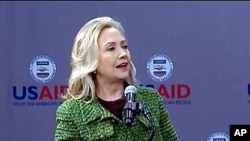U.S. Secretary of State Hillary Clinton said Thursday that there is no cultural justification for female genital cutting, a practice that is sometimes referred to as female circumcision.
Secretary Clinton says governments and non-governmental organizations are making progress toward ending female genital mutilation, or FGM, by reaching out to those who still practice it.
In those societies, it is often justified as a way to protect a girl's purity and cleanliness. Although Clinton said many cultural differences must be respected, this is not one of them.
"We cannot excuse this as a cultural tradition. There are many cultural traditions that used to exist in many parts of the world that are no longer acceptable. We cannot excuse it as a private matter because it has very broad public implications. It has no medical benefits. It is, plain and simply, a human rights violation,” Clinton said.
At the first State Department event marking the International Day of Zero Tolerance to Female Genital Mutilation, Clinton said religious leaders play a big role in stopping the practice in societies that wrongly believe it is a religious imperative or where it is accepted simply because it has been done for generations.
"If a person comes to know that violating human rights and the rights of women to lead a normal life is not acceptable, if the congregation will hear that from the Imam in his Friday sermon, that will empower the women and men who stand against this practice,” said Imam Mohamed Magid, the President of the Islamic Society of North America.
Nafissatou Diop is Director of the United Nations Population Fund and UNICEF joint program against female genital mutilation. Although the practice is most commonly associated with Africa, Diop says outreach efforts must go farther.
"This is beyond Africa -- the Middle East, Colombia, Indonesia, the Philippines and, of course, migrant communities in Western European countries. So we need to build the capacities of others,” Diop said.
Zeinab Eyega is the Executive Director of the Sauti Yetu Center for African Women. She says the issue must be addressed differently in immigrant communities.
"We can't assume that because they have emigrated, they have brought the same social norms here. How do parents make decisions about marriage? What is the transnational connection between here and back home, and how is the information being shared? Dialogue about what values and social norms do they want to continue and which ones do they want to let go?,” Eyega said.
In some areas of northern Iraq, all girls are subjected to genital cutting.
Thomas von der Osten-Sacken is the General Manager of the German non-governmental organization the Association for Crisis Assistance and Development Cooperation. He says that this year six villages in Kurdish areas became the first to declare themselves FGM free.
"They see stopping FGM doesn't only mean stopping FGM. It's a first step to have a better community life, to be an example for others. It's a new concept of honor,” Osten-Sacken said.
At Thursday's State Department event, Clinton said the Obama administration is joining the University of Nairobi to establish a Pan-African Center of Excellence to advance African strategies to address female genital cutting. She says the center in Kenya will focus on developing local solutions to end the practice and offer medical training on how to support women who have been damaged by it.
Clinton: 'Cultural Tradition' is No Excuse for Female Genital Mutilation




